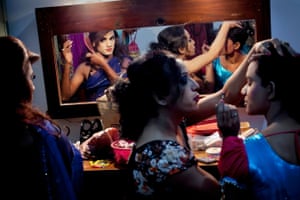Despite being recognised as the third gender, the marginalised hijiras of Pakistan suffer violence and abuse. Now one brave woman is demanding justice
[dropcap]W[/dropcap]hile growing up in Pakistan, Julie struggled with a sense of identity. Something was always gnawing away at her, never fully apparent. One day her boss at the fastfood restaurant where she worked told her to look for the transgender community. She was 19. Her coming out was a rude warning from a society that told her she didn’t belong, that she must find a home elsewhere.
In Pakistan, hijras, a blanket term used to identify transgender women, transvestites and crossdressers, have long been an open part of culture and were recognised legally as “the third gender” through a landmark Supreme Court ruling in 2012.
Traditionally, Pakistanis believe hijras possess the power to bless and curse, and they are asked to bestow blessings at weddings or the birth of a child. This has provided some semblance of respect, but they are far from being viewed as equal and at best regarded as exotic and marginal.
Transgender women live within their own communities led by a “guru”. The communities live in abject poverty but are usually self-sustaining. With limited work opportunities, many earn a living as professional dancers or sex workers, putting them at high risk.
Julie didn’t know what the word transgender meant until she was told that she could no longer live with her family. She had never met another transgender person and knew nothing about the trans community. Today, she’s a proud trans woman, fighting a battle no trans person has dared: pursuing a rape case through the courts.
Asserting her rights hasn’t been easy. The transgender community that embraced her when her own family disowned her feel she is taking an unnecessary risk that could affect them all, and are refusing to support her.
“I am told that I am being irrational, that I am looking for trouble,” Julie says. “I am supposed to be okay after everything that happened because they tell me this is what I was made for. I was made to be abused. I refuse to accept that. I am a trans woman, I wasn’t made to be raped, abused and ridiculed. I am human and I won’t rest until my rapist is in jail.”
The backlash after she decided to pursue charges has been so severe that she has had to flee her home and take refuge in another city.
Sexual assaults against transgender women are widespread. Since 2015, nearly 45 trans women have been killed in Pakistan’s Khyber Pakhtunkhwa province alone. The majority of the attacks go unreported because the trans community doesn’t feel protected by the police. They are routinely targeted with violence when performing at events, and local police extort them.
In the past few years, the transgender community has made strides, starting with being recognised as a third gender. There’s also been a push for better jobs, but some such attempts have caused offence. In 2012, some banks and the tax department started hiring transgender women as debt collectors, giving them a job that would require them to clap, shout, be noisy and embarrass the evader into paying up – a hijra stereotype.
There’s some hope, however. In June of this year, the government of Khyber Pakhtunkhwa announced 200m rupees for the welfare of the transgender community in the budget for the first time in the history of the province. “The purpose is to help make the transgender community contributory members of the society while earning a livelihood for themselves so that they can have alternate sources of income and possibly establish small businesses,” provincial finance minister Muzaffar Sayed told the Guardian.
Uzma Yaqoob, founder and executive director of Forum for Dignity Initiatives, an organisation working for the rights of transgender people and sex workers, thinks Julie’s case could be a watershed moment.
“I see her as a leader, someone who is standing up and not willing to let community pressure impact her resolve,” she says. “This is not just a case of rape, it is about the living conditions that the transgender community is subjected to and the inhumane treatment they face throughout their lives.”
Julie and the rest of the community have experienced a backlash for speaking out. “We have been told that we will be attacked by acid, mutilated and our bodies will be made a warning for anyone who wishes to take a stand against the rape and abuse that goes on unchecked in the transgender community,” says Yaqoob. “But this is the only thing that can change the status of the trans community forever.”

Yaqoob believes the police and local authorities have failed to protect Julie, and that is not the only hurdle in reporting rape: Pakistan’s colonial-era penal code does not recognise the rape of transgender people or men. The only option is to register the case under Section 377, as Julie has done, which refers to “unnatural offences” – the same provision that makes same-sex sexual acts illegal.
Julie was told to settle for monetary compensation while she sat for the medical examination but she would not accept that. “I told the doctor, have people in your family been raped? Is that what you would do? I am not settling for anything else,” she says.
Despite facing harassment and threats, Julie is not giving up: “I am here, I am standing and while I am alive I will fight for my rights and the rights of my community.”
Source: theguardian.com


